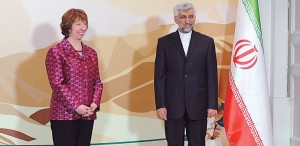 There is no easy way to judge the Iranian nuclear talks. Ultimately, only time will tell.
There is no easy way to judge the Iranian nuclear talks. Ultimately, only time will tell.But in the immediate aftermath of what turned out to be two pretty intense days of talks in the burgeoning spring of southern Kazakhstan, a double-edged verdict seems appropriate.
The talks were partly successful. They were also a setback.
Let�s take the latter first. After a decade of negotiations, Iran and the international community seem nowhere close to a deal that would resolve the concerns of the international community over Iran�s nuclear ambitions.
Indeed, the second successive round of talks in Almaty revealed as starkly as possible how little ground has been closed between the parties in the five rounds of talks since negotiations resumed in Istanbul in April 2012.
The last 12 months of talks have been geared to one thing: enticing Iran via modest sanctions relief to agree to initial confidence-building steps that address the most urgent concerns of the international community. Those are Iran�s enrichment of uranium to 20% purity and its stockpile of�20% enriched uranium, considered a technical step from weapons grade; activities at the near-impregnable underground site of Fordow; and the International Atomic Energy Agency�s incomplete access to military and other sites of interest.
Yet senior western diplomats painted a picture Saturday of an Iranian team that was only prepared to nibble at the edges of the offer.
Despite �long and intensive discussions� in Almaty this week, the two sides �remain far apart on the substance,� said European Union foreign policy chief Catherine Ashton, who chairs the group of six powers. She said the group of six was prepared to negotiate �different elements� of its confidence-building offer but Iran wasn�t biting.
A senior U.S. official was more explicit. The six powers were �disappointed� with Iran�s �minimal response to our proposal.�
Iran offered �very, very tiny steps in our view� and Iranian chief negotiator Saeed Jalili wanted �a lot in return.� The gap between the two sides was �fairly huge.�
Yet on another level, the second day of talks in particular offered what the chief Russian negotiator Sergei Ryabkov called a �definitive step forward� in the talks, Reuters reported.
In part, it was tone. There was �real back and forth,� Ms. Ashton said, �where we were able to discuss details.�
The exchanges, the senior U.S. official said, �were more natural and free-flowing than they had been in past P5+1 talks and my colleagues, who have been doing this, some of them, for a decade, had never seen anything quite like it.�
But it wasn�t just tone. In a no doubt unintentional echo of the Beatles song, the U.S. official said there was just �something� about this week�s talks that offered hope�some almost intangible kind of �traction.�
What that seems to boil down to is two things. First, a willingness by Iran to discuss each of the main elements of the six powers� offer even without presenting a clear or coherent counteroffer. Given that Iran has barely agreed to talk about its nuclear program in past talks, that is quite a change.
To illustrate the point, although the U.S. was the only one of the six major powers Iran didn�t hold bilateral talks with on the sidelines, an official involved in the talks described a session lasting 30 to 45 minutes where a top U.S. official pinged question after question at Mr. Jalili about Iran�s nuclear stance in what was essentially a two-way dialogue.
Second, Iran does seem willing to at least envisage concessions on several of the key concerns, even if these are currently wrapped in various conditions.
On the stockpile of 20% enriched uranium, one six power official said that even on Friday, Mr. Jalili�s team were signaling they were open to converting much of the stockpile of into a form of fissile material that would make it significantly harder to weaponize.
And on the critical issue of a suspension of 20% enrichment, Mr. Jalili was more explicit than ever in his news conference when The Wall Street Journal and several other reporters pressed him on it.
This can �be an issue to help create further confidence,� he said. �We are ready to talk about these ideas and explore them.�
Ultimately, none of these shifts in language and approach may matter. Over the last decade of talks, there have been plenty of false dawns�including a brief period when Iran suspended all enrichment and a near-deal on Iran�s uranium stockpile in 2009 that Iran eventually walked away from.
As talks drag on, so does Iran�s uranium enrichment and the prowess (still modest) of its nuclear technology. What matters in the end is whether Iran is ever willing to sign up to specific compromises in time to avert conflict. But there was at least a glimmer of hope in Almaty that this day could still come.
By The Wall Street Journal
The Iran Project is not responsible for the content of quoted articles.










